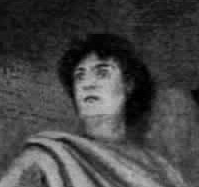 Alexander the Great's death in 323BC has been attributed to different causes like poisoning, pancreatitis or typhoid, but what seems to have hastened his demise was an extended drinking session, part of which may have been a celebration in honour of Dyonysus, the god of (among other things) wine. If so, he was by no means its last casualty.
Alexander the Great's death in 323BC has been attributed to different causes like poisoning, pancreatitis or typhoid, but what seems to have hastened his demise was an extended drinking session, part of which may have been a celebration in honour of Dyonysus, the god of (among other things) wine. If so, he was by no means its last casualty.The earliest alcoholic drinks seem to have been fermented independently from rice in China, and from both barley and (of course) grapes in the Middle East, around the seventh millennium BC. Mesopotamian clay-tablet art shows people drinking from vats with straws,
 and beer was so important to the pharoahs that jars of it would be interred with them.
and beer was so important to the pharoahs that jars of it would be interred with them.We have a hint of problematic alcohol use in St Paul's first letter to Timothy, where he cautions that "deacons, likewise, are to be men worthy of respect, sincere, not indulging in much wine, and it's been suggested that as a causative factor in the fall of Rome, as well as a decline in public morals, political corruption and unemployment, alcohol use increased as well adding to the incompetency of the general public.
What I hope is beyond debate is that, while alcohol can be a social lubricant, it has its dangers, and the border between the two is by no means well delineated.
Therefore I'm astounded that it's still possible to buy 500ml cans of 9% lager, when the customer base for this beverage is known to be almost exclusively people who are drinking problematically, and sometimes also using it as an adjunct to prescribed or illicit drugs. For example, even though one such can of Carlsberg Special Brew would put one over the Government's recommended drinking levels for the whole day, the website still maintains that the mixture was concocted in 1950 for Winston Churchill: but I'm not aware of the old warhorse having a taste for paint-stripper in syrup - and that's before one considers "cheap cider...that has never seen an apple".
So I'm not totally surprised that the Tesco store in Cambridge's Mill Road has been refused an alcohol licence - because the thoroughfare has, over the years, accrued a name for alcohol-related problems. The thing is, the problems aren't due to people getting loaded up on Cabernet Sauvignon or some such: those small independent traders lionised by the No Mill Road Tesco campaign that have a licence to sell alcohol sell, without exception, Winston's ruin and cidre sans pommes.
That's not the only problem - I can think of a top-selling beer and an equally popular spirit that, in the substance misuse treatment trade, share the unfortunate epithet "wife-beater juice" because of the interactions between the various higher alcohols and certain personality types. (I say "certain" because many people can have a pint of one with the other as a chaser and remain calm as a cucumber.)
The response of the present Government to all this is to propose measures to enforce a minimum price on alcohol, which is good in the sense that selling booze as a loss-leader is asking for trouble.
But what would complement this, I think, would be an approach in which banning loss-leading alcohol would be one of three branches. Given that strong lagers and ciders are big sellers in deprived areas, councils could be given powers to shut down shops who refuse to reduce the proportion of strong cheap drinks to more conventional alcohol - I have seen shops whose main stock in trade was poor old boys desperate to stop the shakes in the morning.
And lastly, we - whatever our political colour - need to foster a resurgence in responsibility. To get blind drunk every weekend for a prolonged period of time is not unknown to lead to Korsakoff's psychosis; how about raising the price of drinks in supermarkets but allowing it to come down in pubs, where it's in the self-interest of a cadre of social drinkers to tell an individual when he's had enough?
Serial toasts are raised to many things, but I think poor old Dionysus, were he real, would say in the majority of cases, "not in my name".











No comments:
Post a Comment
Please feel free to leave a comment - Frugal Dougal.